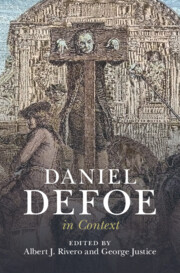Book contents
- Daniel Defoe in Context
- Daniel Defoe in Context
- Copyright page
- Contents
- Illustrations
- Notes on Contributors
- Preface
- Acknowledgements
- Chronology
- Part I Life and Works
- Part II Literary Context
- Chapter 6 Defoe and the Novel
- Chapter 7 Defoe and Popular Fiction
- Chapter 8 Verse and Verse Satire
- Chapter 9 Memories and Memorials
- Chapter 10 Periodicals, News, and Journalism
- Chapter 11 Defoe and Pornography
- Chapter 12 Defoe and Popular Religious Writing
- Chapter 13 Theatre and the Novel
- Chapter 14 The Philosophical Tradition
- Part III Authorship and Copyright
- Part IV The Monarchy and Parliament
- Part V Social Structures and Social Life
- Part VI Critical Fortunes and Literary Afterlife
- Further Reading
- Index
Chapter 12 - Defoe and Popular Religious Writing
from Part II - Literary Context
Published online by Cambridge University Press: 27 April 2023
- Daniel Defoe in Context
- Daniel Defoe in Context
- Copyright page
- Contents
- Illustrations
- Notes on Contributors
- Preface
- Acknowledgements
- Chronology
- Part I Life and Works
- Part II Literary Context
- Chapter 6 Defoe and the Novel
- Chapter 7 Defoe and Popular Fiction
- Chapter 8 Verse and Verse Satire
- Chapter 9 Memories and Memorials
- Chapter 10 Periodicals, News, and Journalism
- Chapter 11 Defoe and Pornography
- Chapter 12 Defoe and Popular Religious Writing
- Chapter 13 Theatre and the Novel
- Chapter 14 The Philosophical Tradition
- Part III Authorship and Copyright
- Part IV The Monarchy and Parliament
- Part V Social Structures and Social Life
- Part VI Critical Fortunes and Literary Afterlife
- Further Reading
- Index
Summary
The breadth of topics covered in Defoe’s extensive canon is universally acknowledged, but so too is the seemingly consistent nature of an authorial perspective marked by authority, firm occupation of the moral high ground, and extensive use of scriptural imagery and language. This chapter considers the textual and biographical evidence for Defoe’s erudition in religious literature. Immediately apparent is Defoe’s use of specific stylistics shared with contemporary ministers, both within and outside the established church. In an author trained from an early age to join the ministry, such linguistic features are hardly surprising, though Defoe’s ministerial training and scholarship is equally apparent at the level of structure and rhetorical device. The chapter further explores how a cultural period fraught with religious contention between English Protestants came to shape the purported identity of Defoe’s authorial ‘voice’ as that of a non-specific Protestant Christian. Notwithstanding this specific authorial response to contesting notions of Christian identity in the period, Defoe engaged first-hand in a series of contemporary religious debates, which the chapter also scrutinizes.
Keywords
- Type
- Chapter
- Information
- Daniel Defoe in Context , pp. 96 - 104Publisher: Cambridge University PressPrint publication year: 2023

